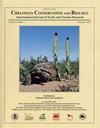Population Genetic Structure of the Threatened Amazon River Turtle, Podocnemis sextuberculata (Testudines, Podocnemididae)
IF 0.8
4区 生物学
Q3 ZOOLOGY
引用次数: 4
Abstract
Abstract Podocnemis sextuberculata (Pleurodira: Podocnemididae) is widely distributed throughout the Amazon drainage basin in Brazil, Colombia, and Peru. Telemetry and previous molecular data suggest that P. sextuberculata lacks population structure in the central Amazon basin of Brazil. Generalization of these results, however, requires much-broader sampling across a range of habitats of this broadly distributed species. For this reason, we tested the hypothesis of panmixia in P. sextuberculata, analyzing a total of 319 specimens sequenced for the mitochondrial control region. Our sampling included localities from 16 areas in the Amazon basin from rivers characteristic of the Amazon basin (whitewater), clearwater rivers of the Guiana shield (Branco, Trombetas, and Nhamundá rivers), and the Brazilian shield (Xingu River). The hypothesis of panmixia was rejected because the results of analysis of molecular variance, pairwise ФST, and Bayesian analysis of population structure indicated population structure in the group of individuals from the locality of Xingu which was not correlated to a pattern of isolation by distance. We suggest that the populations of P. sextuberculata of the Brazilian Amazon basin are composed of 2 management units, one represented by populations restricted to the Xingu River and the other represented by all other populations. The population of the Xingu should be viewed with attention and concern, especially considering the direct and indirect impacts of damming the Xingu River.受威胁的亚马逊河龟六疣足龟的种群遗传结构
摘要六结节足鼠(Podocnemis sextuberculata)广泛分布于巴西、哥伦比亚和秘鲁的亚马逊流域。遥测和先前的分子数据表明,巴西亚马逊河流域中部的六瘤p缺乏种群结构。然而,要推广这些结果,需要在这种广泛分布的物种的栖息地范围内进行更广泛的采样。因此,我们通过对319个线粒体控制区测序样本进行分析,验证了P. sextuberculata存在panmixia的假设。我们的采样包括亚马逊流域16个地区的亚马逊流域特征河流(白水),圭亚那盾的清水河流(布兰科河,特朗贝塔斯河和纳姆蒙河)和巴西盾(新谷河)。由于分子方差分析、配对ФST和种群结构贝叶斯分析的结果表明,新古地区个体群体的种群结构与距离隔离模式不相关,因此拒绝了panmixia假说。结果表明,巴西亚马逊河流域的六瘤桫椤种群由2个管理单元组成,一个以新古河种群为代表,另一个以其他所有种群为代表。新谷河的人口应该受到重视和关注,特别是考虑到在新谷河上筑坝的直接和间接影响。
本文章由计算机程序翻译,如有差异,请以英文原文为准。
求助全文
约1分钟内获得全文
求助全文
来源期刊
CiteScore
1.70
自引率
14.30%
发文量
17
审稿时长
>12 weeks
期刊介绍:
Chelonian Conservation and Biology is a biannual peer-reviewed journal of cosmopolitan and broad-based coverage of all aspects of conservation and biology of all chelonians, including freshwater turtles, marine turtles, and tortoises. Manuscripts may cover any aspects of turtle and tortoise research, with a preference for conservation or biology. Manuscripts dealing with conservation biology, systematic relationships, chelonian diversity, geographic distribution, natural history, ecology, reproduction, morphology and natural variation, population status, husbandry, community conservation initiatives, and human exploitation or conservation management issues are of special interest.

 求助内容:
求助内容: 应助结果提醒方式:
应助结果提醒方式:


